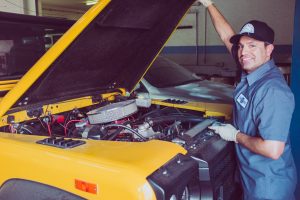What to Do When Your Car Overheats
Posted Friday, Aug 04, 2023
Dealing with a car that overheats can be a stressful and potentially dangerous situation. However, it's important to stay calm and take the right steps to prevent further damage to your vehicle. In this article, we will outline a simple guide on what to do when your car overheats, ensuring your safety and the well-being of your vehicle.
 Recognize the Signs: The first step is to identify the warning signs of an overheating engine. These may include a rise in the temperature gauge, steam coming from under the hood, a strong smell of coolant, or unusual sounds. As soon as you notice any of these signs, it's crucial to act quickly.
Recognize the Signs: The first step is to identify the warning signs of an overheating engine. These may include a rise in the temperature gauge, steam coming from under the hood, a strong smell of coolant, or unusual sounds. As soon as you notice any of these signs, it's crucial to act quickly.- Pull Over Safely: Once you've recognized the signs, find a safe place to pull over immediately. Turn on your hazard lights to alert other drivers. It's important to stop as soon as possible to prevent further damage to the engine.
- Turn off the Engine: As soon as you've pulled over, turn off the engine. This will allow it to cool down and reduce the risk of further overheating. Do not attempt to open the hood right away, as it can be dangerous due to the high temperature. Give it some time to cool off.
- Check the Coolant Level: After the engine has cooled down, carefully open the hood and check the coolant level. If it's low, you may need to add more coolant. However, avoid removing the radiator cap while the engine is hot, as the pressure can cause hot coolant to spray out and cause burns. It's best to wait until the engine is completely cool before adding coolant.
- Call for Assistance: If you're unable to identify the cause of the overheating or if the problem persists even after adding coolant, it's advisable to call for professional assistance. A qualified mechanic will be able to diagnose and fix the issue effectively, ensuring the safety and reliability of your vehicle.
Experiencing a car overheating can be a nerve-wracking experience, but by following these steps, you can effectively manage the situation and minimize potential damage. Remember to stay calm, pull over safely, turn off the engine, check the coolant level, and seek professional help if needed. By taking these measures, you can ensure your safety on the road and preserve the health of your vehicle.
Photo by Kenny Eliason on Unsplash